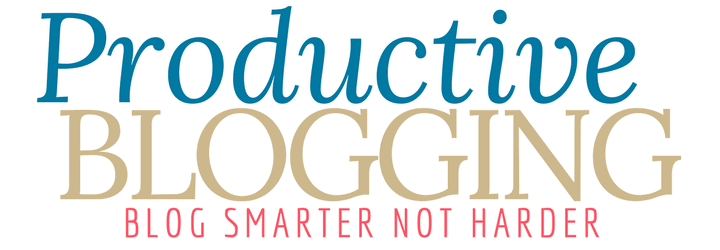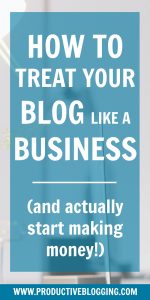How to treat your blog like a business (and start actually making money!)
I may get paid commission for purchases made after clicking a link in this post.
Do you want your blog to be more than just a hobby? Do you wish your blog made enough money to be your full-time job? Here’s how to treat your blog like a business (and start actually making money!).
It blows my mind to think that in less than 2 years I took my blog from nothing to a profitable business. Owning my own business was the thing that I always wanted to do but never realised – it took me the best part of 40 years to figure it out!
I knew I wanted to work ‘in business’ from about the age of 15. Largely inspired by the film ‘Working Girl’, which is still one of my favourite films of all time. It sounds daft, but it was the business mindset of the lead character, played by Melanie Griffith, that really inspired me – the way she connected the dots and figures out how to make the deal (in this case a corporate merger).
I studied business at one of the UK’s top business schools, spent a year working as an intern for a big multinational in Paris, worked for a while in the wine buying team for a Bristol wine merchant, then landed myself a dream marketing role at a well-known luxury supermarket.
But somewhere along the line I got burnt out and quit ‘business’. Years working as an English teacher in the EFL industry and two kids followed before a couple of small things made me realise I could combine my passions for food, writing and business and start my very own bloggy biz.
I was fortunate as my business training meant I set up my first blog, Easy Peasy Foodie, as a business right from the get go AND had the business skills to know how to get it to make money.
For many bloggers the whole idea of turning their blog into a business comes a bit later down the road… or even happens accidentally!
But I also see so many bloggers who desperately want to turn their blogs onto fully fledged businesses, but don’t know how. Or worse, brilliant bloggers quitting blogging because they can’t make money from it. This was a big reason for starting Productive Blogging. I wanted to share my skills and help as many bloggers as possible to fulfil their dreams.
But in order to make your bloggy biz dreams a reality you need to treat your blog as a business. Here’s how…
Have a business mindset right from the start
The number of times bloggers have told me ‘I’d love my blog to be my business, but it doesn’t make any money.’…
Stop that thinking right now! Your blog doesn’t have to make money right from the start to call it a business.
Think about it. If you started a more traditional business, let’s say a café, you might take out a big loan from the bank and not pay that off for many years.
Technically, you might not make a profit for a long time. But would you call it ‘just a hobby’ until you actually made a profit? Of course not! So start calling your blog your business from TODAY!
Set your business hours and stick to them
If you truly want blogging to be your business, you have to treat it like a business. That means setting your hours and sticking to them.
You wouldn’t just take a random day off any other job because you didn’t feel like it or because the pile of ironing was too huge, would you? So don’t do that to your blog!
Of course, I don’t necessarily mean working 9-5 (however good the Dolly Parton song is!).
You may already have a full-time job or childcare commitments, which mean you can’t work ‘normal’ office hours.
It may be that you can only work 8-11pm once the kids are in bed or 5-8am before you go to work. Or maybe you can only work on your blog at the weekends.
The important thing is not WHICH hours you choose but that you STICK TO THEM, just as you would stick to your work hours in any other job.
Don’t blog in your PJs
A controversial one, I know, but dressing the part really makes a difference.
Have you ever done a phone interview? Then you’ll probably have heard the tip that you should dress for a phone interview in exactly the same way as you would dress for a face-to-face interview. Because how you dress affects your mindset.
Dressing in your pyjamas (or similar) puts your mind in ‘oh it’s just a hobby’ mode.
But dressing relatively smartly – as you would for a day in the office, puts your brain in ‘this is my job’ mode and will help you treat your blogging more professionally.
Don’t believe it? Try it!
Now, I will confess, I don’t wear a suit to blog in! But I do wear smart-casual clothes and I always wear makeup. Basically, I dress the same as I would if I were meeting a client, even if it’s just me in front of the computer in my office all day.
Have an ‘office’
So I realise not everyone is lucky enough to have their own office from which to blog. (Hey, it took me YEARS to get there – thank you Mr G for making me my very own home office!)
BUT that doesn’t mean you can’t have a regular place where you can ‘set up office’ so to speak. It might be your kitchen table. It might be your spare room, a corner of the living room or your bedroom.
But, if you possibly can, carve out a little space in your home to be your ‘office’, where you do your work and where all your blog related things live.
Again it taps into that ‘this is my job’ mindset and will trick your brain into being more business-like. It will also make you more organised and tidier as all your blogging things will be together.
Ok so far I’ve talked about getting that business mindset, but now let’s switch gears and talk about the practicalities…
Define your niche
No successful business I know of has started out without focusing on a specific niche. It’s like Business 101: focus on a specific target audience and give them what they want.
When you start out in business it’s much easier to get customers if you ‘niche down’ and create a product that is just perfect for a small target market, rather than a product that is trying to serve everyone in a larger one.
Think about your favourite fashion brand, for example. There’s a good chance they are focusing on one pretty specific type of customer. Is it male or female? Younger or older people? People who are happy to spend money on quality clothes or people who want cheap clothes? People who are very fashion conscious or people who prefer comfort…
It’s very unlikely that a single fashion brand will be able to appeal to ‘everyone’ – the compromise would be so great that they’d end up appealing to no one and the business would be a flop.
Well, the same is true with blogging: generally speaking the tighter the niche, the more likely you are to succeed. There is a lot of truth in the phrase ‘the riches are in the niches’.
Just look at someone like Deliciously Ella, for example, who has done incredibly well focusing on the really rather micro niche of vegan/gluten free/healthy food.
A niche means people are more likely to identify with your blog and your core values, more likely to hang on your every word, buy everything you recommend and tell their friends about it, than a blog which is just a bit of everything with nothing to really identify with.
READ MORE >>> How to choose the right niche for your blog
Create content your audience loves
It’s not enough just to know ‘who’ your audience are. You need to create content that they want to read (or watch).
A BIG mistake I’ve seen so often is bloggers who create what THEY want to write about, rather than what their readers want to read about.
Now obviously if blogging is your hobby, then it’s fine to write whatever you want about. But if blogging is your business, you need to think about what your customers (AKA your readers) want.
This means thinking about WHO they are and WHICH of their problems you can solve. It also means doing keyword research to find out WHAT people are searching for. It can also mean actually asking your existing readers – either via email or on social media – what they want to see.
For example, with my food blog Easy Peasy Foodie, my target market is ‘busy people who want to eat well (delicious food that is relatively healthy), but don’t have a lot of time to cook’.
My audience is mainly female, typically in their 30s and 40s (although a significant proportion are in their 20s and 50s) and often they have children. I create recipes that those people want to eat. I create one pots, 30 minutes meals, traybakes, slow cooker food, family friendly meals and leftovers meals that I know will appeal to my audience. My most popular category is my Easy Midweek Meal Ideas category, because this is what my audience most want/need.
Aim for quality over quantity
Quality is a big deal in business. Going back to my fashion example above, you would not be happy if you bought a new t-shirt, but then discovered later that it had a big stain down the front or a rip in the sleeve.
In the same way people are not going to want to read your blog if it is poorly written, with bad photographs and/or difficult to navigate.
Try to look at your blog from your readers’ perspective. If you were a reader, would you want to read your blog? Identify what you can do better. If you can’t figure it out, ask a friend. Or ask in my Productive Blogging Community Facebook Group.
Good things to focus on are: the quality of the writing, the quality photos and the overall blog design. Work hard on improving these aspects. It may mean you need to invest in a professional blog theme or a better camera. Or it may mean you need to take more time over writing and proof-reading your blog posts.
Not only will your readers be more engaged if the quality is better, but brands will be more interested in working with you and you’ll do better in Google searches too!
Promote, promote, promote
Every business needs to spend time (and usually money) on marketing their brand, and blogging is no different. Creating brilliant content your readers will love is pointless if your readers never get to see it.
After you have published a blog post, make sure you spend a really decent amount of time promoting that blog post before you even think of writing the next one.
As bloggers, we are really lucky to have many free ways to promote our bloggy businesses. Social media, email marketing, guest posting, SEO, linkies and more!
READ MORE >>> 14 things you should do AFTER you publish a new blog post
Plan how you are going to make money
Another thing that all successful businesses do is plan HOW they are going to make money, yet it’s surprising quite how many bloggers neglect this important step!
There are 5 key ways that blogs make money: advertising, affiliate links, sponsored posts, products and services.
Which of these ways are you going to use to monetise your blog? And what steps will you take to get there?
For example, if you choose to make money through affiliate links, you will need to join affiliate programs and create blog posts which (subtly) ‘sell’ those affiliate links.
If you plan to make money through selling digital products, such as ebooks or courses, you will need to create your product, build your email list and create content on your blog that will act as a lead magnet, drawing potential customers in.
READ MORE >>> How to create a blog monetization strategy (and why you need one!)
Be proactive
Whatever you do don’t just sit there waiting for the email of your dreams to drop into your inbox, offering you thousands to review your favourite brand. Be proactive!
If you want to earn money from sponsored posts, find out which PR companies represent your favourite brands and pitch your ideas for sponsored content to them. Ensure you have an awesome Media Kit and that your blog is as attractive as possible to the PRs who represent that brand.
If your dream is to write for favourite publication, find out who commissions articles and what their criteria is and send over some ideas. (Read Mandy Mazliah’s fab post on How to get freelance blogging work for more help with this.)
If your dream is to get a publishing deal, research publishing houses, find out what they do and don’t accept, write a proposal and send it to the right person.
You get the idea, right?
Negotiate
And whatever you do, don’t work for free! (Unless there is some other really good reason to do it.) One of the big reasons why bloggers aren’t getting paid well to do sponsored posts / freelance work / speaking engagements etc. is because they are too willing to work for free.
Often the first email from the brand will not mention money. Well of course it doesn’t! If you think you can get someone to do something for free, why would you offer money?
It’s up to us as bloggers to NEGOTIATE. Whenever anyone asks you to do something related to your blog, ask them what their budget is – or send over your rate card. If there is genuinely no budget, ask yourself seriously if there is any real benefit in you doing it (sometimes there is and that’s OK, but usually there isn’t).
If the budget is lower than you would normally work for, can you negotiate on WHAT you do for that budget. For example, if a brand says the budget is £50, tell them they can’t have a blog post for that much, but perhaps offer an Instagram or Facebook post instead.
READ MORE >>> How to work with brands (and get paid!) – a guide for bloggers and influencers
Accounts
If your blog is your business, you need to get your accounts in order.
In fact, if you’re earning any money from your blog or even ‘just’ getting free products, you need to ensure you are declaring that income correctly.
From a tax perspective you are ‘in business’ as soon as you earn your first penny.
Now I am not a tax lawyer or an accountant, so I’m not going to start giving any specific advice here – especially as this blog is read by people all over the world and every country has their own way of doing things!
But you do need to research and find out what you need to do.
Here in the UK you need to register as self-employed, you need to file a tax return annually and you need to keep an accurate record of all your income and outgoings.
You don’t necessarily need an accountant if you can manage the above on your own, it depends on how organised you are and how complex your business is.
For the first 5 years of blogging, I managed my own accounts and filed my own tax return each year – this worked well for me as I’m super organised and have a record of everything in a nice colour coded spreadsheet. But eventually my business became more complex and so I finally hired an accountant!
If your blog business is complex, you are a bit disorganised with your finances or you are just completely baffled by the tax return form, you may need an accountant too!
READ MORE >>> How to keep track of your blogging income and expenses
Fake it until you make it
Sadly there are people in the word who like to tear other people down. And if blogging is your business, you will repeatedly encounter people who want to belittle what you do and/or just can’t quite wrap their heads around the idea that blogging can be a legitimate career choice.
My top tip is to do what they say and ‘fake it until you make it’. Well not ‘fake it’ exactly, but hold your head up high and act as if your blog is a proper job (which it is – it’s as legit as any other start up business). If people ask what you do, confidently tell them you are a blogger.
If people ask how you make money, don’t admit you’ve only made 5 quid so far, instead tell them how blogs make money. It’s none of their business HOW MUCH you’ve made.
Tell people when you are going to brand events and blogging conferences. Tell people about the exciting brand campaigns you’ve worked on and the people you’ve met.
Don’t ever use the word ‘just’ (as in it’s ‘just’ a bunch of bloggers meeting up really… I’m ‘just’ a small blogger, it was ‘just’ a blogging conference…).
Instead turn the situation to your advantage – tell them all about what you do and what your blogging goals and dreams are. Get them enthused about this exciting new industry and all the possibilities it offers!
Remember the reason people are often negative about blogging is because they simply do not understand. It’s our job to make sure people ‘get it’ and get how exciting it is!
But on the flip side, don’t go too far the other way and become a blogging prima donna – or worse lie! Just put a positive spin on what you do, be proud of your work and never feel the need to tell other people how much you earn!
So hey, I hope you found this post useful. Blogging can be the most incredible and rewarding business. I am so grateful every day that I get to call blogging my job. I’d love to hear about the steps you are taking to treat your blog as a business.
And as I said above I said above, I love to use my business experience to help others – so if you have a question about this post or about blogging as a business in general, feel free to ask in the comments below.
- 14 reasons why your blog isn’t making money (and what to do about it!)
- How much do bloggers REALLY earn? (Results from the Blogging Income Survey)
- 21 reasons why bloggers should stop working for free
- 12 easy ways to grow your Mediavine income
- How to create a blog monetization strategy (and why you need one!)
Don’t miss a thing!
Follow me on Twitter, Facebook and Instagram. Or why not subscribe to Productive Blogging and get blogging and productivity tips straight to your inbox every week?








Hi,
Thank you for your tips.
I have been running my own fitness business for over 12 years and have had enough and want a new challenge.
I love writing and want to start a blog. I am in the process of setting it up at the moment.
One of the things I loved when training clients was finding out about their lives. We all have interesting stories to tell.
The blog I am setting up is called ‘Ordinary People’. It will focus on the lives of those we perceive to be just “ordinary people”.
So, a ‘lifestyle’ blog.
Yes, I would like to make some money out of it (doesn’t have to be lots lol), but not really sure how.
I am not the most techno savvy so forgive me if I ask a stupid question. Can I allocate advertising space on my site around the borders for example? Is that considered an acceptable way to do it? Does the amount you charge (wouldn’t have a clue how much that would be) depend on the traffic you generate? Can others see how many people have read a blog? Or does it go by subscribers?
Any more snippets of info you could give me would be much appreciated.
Thanks for your time.
Dave ?
Hi Dave!
OK, so the first thing I would say is take care with that niche. It is incredibly difficult to make a lifestyle blog work these days (those who are successful have either been doing it for years, or are already celebrities). Most bloggers find the best and easiest way to grow a blog and be successful is by getting their blog on the first page of Google for lots of different search terms (this is called SEO).
The thing that worries my about your choice of blog topic is that I can’t imagine what search query (the thing your target reader might type into Google) would lead them to your blog posts… and that makes me worry that you might struggle to get much traffic with a blog like that. And without decent traffic, it’s pretty much impossible to monetise. I really recommend you think long and hard about your niche before you go ahead… this decision can literally make or break your blog. Check out this post for more help on picking a good niche >>> https://www.productiveblogging.com/how-to-choose-the-right-niche-for-your-blog/
Now, to answer your question on monetisation. There are broadly 5 ways to monetise a blog ads, affiliate links, sponsored posts, products and services. You can find more about that here >>> https://www.productiveblogging.com/how-do-blogs-make-money/
To get ads on your site, you work with an ad management company. I use one called Mediavine. You can find out how that all works here >>> https://www.productiveblogging.com/make-money-with-mediavine-ads/ the catch is that to work with an ad company that pays well, you need a lot of traffic! Mediavine requires 50,000 pageviews per month and with that level of pageviews you can expect around $500-$1000 dollars per month. (To make the really good money, you obviously need more pageviews!)
But to even get 50,000 pageviews, you need to work really hard on your SEO as really the only way to get that level of traffic is by showing up in a lot of Google search results. Which takes me neatly back to the first point.. that I am worried about your chosen niche and would anyone actually be searching on Google for that?
To find out more about SEO, check out this post >>> https://www.productiveblogging.com/start-a-profitable-blog/
And to get my step by step plan for starting a new blog from scratch, check out this post >>> https://www.productiveblogging.com/beginners-guide-seo/
Hope that helps! And do let me know how you get on. Eb 🙂
Promoting my blog and maintaining promoting a blog I believe is by far the hardest!
Aw, it can be hard… but I think it really helps to have a good promotion routine… and also scheduling tools like CoSchedule and Tailwind make ALL the difference! Eb 🙂
I have been reading and using a lot of your material to help me create plans to grow my blog. Thank you so much for everything! It is really helping me get on the right track.
Aw, thanks for this lovely comment, Corinne! I am so happy you are finding my website so helpful 😀
Thanks for the article! Blogging can be a business, and a profitable one at that.
You are welcome. Couldn’t agree more!
Wow! So insightful. Thank you for this information. You are so right, treat your blogging business like a new cafe, it will take time to make a profit and see a return on investment! I’m a new mama looking to make some passive income. Trying to write more, be more authentic and be patient with myself! I started my blog during the 2020 pandemic and put tremendous pressure on myself to put all my time and money into my new blog, which unfortunately did not pay off. But 4yrs later, I’m still working at it and I’m seeing an uptick in my views and income. Granted I don’t blog full time, so I’m content with my progress. 😊
Great to hear you found my post helpful. And so good to hear you are finally seeing all your hard work start to pay off! I wish you every success with your blog 😀